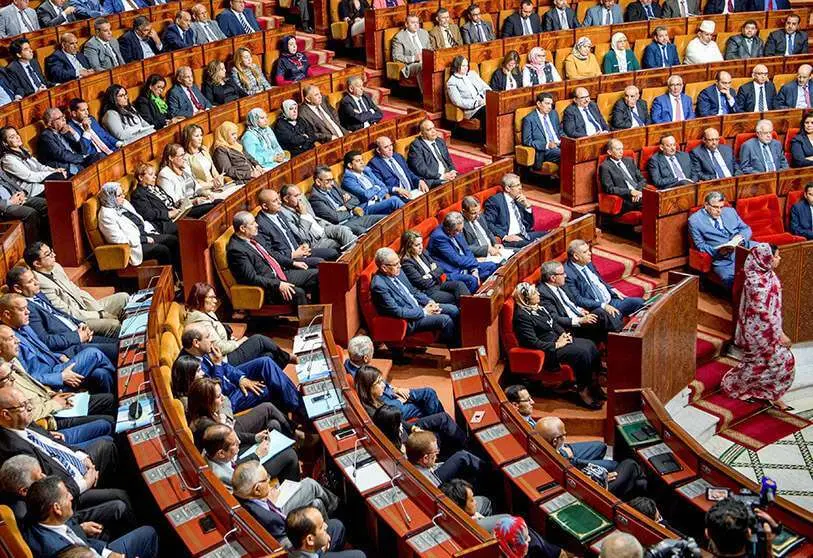Las mujeres marroquíes piden más cuotas electorales para llegar a la paridad

A few days before the general elections on 8 September, Moroccan women are calling for an increase in quotas for women in representative bodies in order to counteract the dominance of the macho mentality within political parties and society and to achieve parity.
"We have normal ambitions that reflect the same commitments expressed in the Constitution, i.e. the duty of the state to impose parity. We are not content to fall short of parity," said Morocco's former Minister of Solidarity, Women and Family and Social Development, Nouzha Skalli, in an interview with Efe.
Skalli refers to article 19 of the Moroccan Magna Carta (2011), which stipulates that "men and women enjoy equal civil, political, economic, social, cultural and environmental rights and freedoms (...) and the State acts to achieve parity between men and women". According to the former minister, there is still much to be done to achieve this ambition.

With the aim of advancing gender equality, Morocco has been adopting regulations since 2002 to establish quotas in representative bodies. They currently stand at 22.7 per cent for the House of Representatives (lower house) and one third at regional and local levels.
In the 1992 and 1997 local elections, women accounted for 0.24 and 0.55 per cent respectively of local elected councils, but thanks to the implementation of the quota system, this percentage rose to 12.3 per cent in the 2009 elections. "It was a real revolution", recalls the former minister.
In the legislative branch, women's representation in the House of Representatives rose from two women deputies in the 1993 elections to 35 in the 2002 elections, out of a total of 325 seats in the House at the time.
Of these, only five won seats competing on equal terms with men, while the remaining 30 were won thanks to the women-only quota. This is because when voting in Morocco, the voter has to enter on his or her ballot a mixed list and, obligatorily, an all-female list.

The number of women candidates included in these mixed lists for parliament does not exceed 2 percent due to the dominance of the macho mentality, the economic inequality between the sexes and the social burdens of women, who, in addition to their professions, carry the burden of household chores, unpaid work, Skalli laments.
With regard to the economic gap between the sexes, only 19.9 per cent of women work, a figure that rises to 70.4 per cent for men, according to a study published in 2020 by the High Commission for Planning (HCP, the Moroccan state statistics body).
The annual Global Gender Gap Index report, published by the World Economic Forum, ranked Morocco 143rd out of 153 countries included in the 2020 study.
This ranking is a downgrade from 2010, when Morocco was ranked 127th.
In next month's general elections, which for the first time combine legislative, regional and local elections, women are competing for 90 seats in the lower house (out of a total of 395 members), while in local elections they have been allocated a third of the seats.
"No movement has succeeded in improving women's political representation without affirmative action," insists Skalli, who calls for an increase in quotas to reach parity.

Although she acknowledges that Morocco is at the forefront of Arab countries, where the average quota is 19 percent, it loses out in comparison with other African countries such as Senegal, where quotas have brought it up to 43 percent. Globally, the average quota for women is 25.6 percent, higher than that of the Moroccan parliament.
The 71-year-old former minister, a left-wing activist and staunch advocate of women's rights, was one of eight Moroccan women candidates in the 1977 parliamentary elections, none of whom won seats.
However, 2,329 women candidates (34.17 per cent of the total number of candidates) are standing in the general elections on 8 September, while 47,060 women (30 per cent) are running in the local elections.
Analyst Omar Cherkaoui explained to Efe that the gender quota was an inevitable measure in a conservative society in order to achieve the parity stipulated by the Constitution and to ensure that the elected institutions did not remain "male dominated".

Thanks to these measures, which have been strengthened since the adoption of the constitution in the midst of the "Arab Spring", two women were elected, for the first time in Morocco's history, to the mayorships of Tangier and Marrakech, two of the country's most important cities.
Cherkaoui added that they are part of a broader package of measures in favour of women's participation, as the new law on political parties obliges parties to have one third of their executive members be women.
So far, the only woman to lead a political party in Morocco is professor Nabil Mounib, who became the secretary general of the United Socialist Party (PSU) in 2012, setting a precedent in Moroccan politics.








